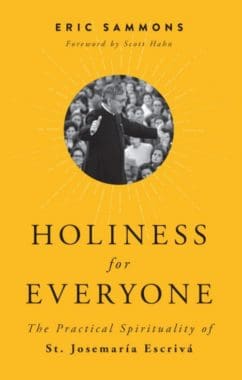We will find it no easy task to achieve holiness through our work, afflicted as it is with two effects of the Fall. First, our weakened natures struggle to carry out our responsibilities—we are lazy and seek pleasure and comfort. To make matters worse, we live surrounded by other fallen creatures, who seek their own pleasure and comfort. So no matter where we turn, hard work is shunned and avoided! Furthermore, we are under relentless pressure to compromise our faith—to accept the lies of this world and the prince of this world—both in our work and our family life.
Because of these pressures, we may be tempted to think that if we could just change our state in life, we could avoid those struggles. In ancient days, very few people had the opportunity to change their lot in life, so few even considered it. But today, when people change jobs—and even spouses—as easily as changing their shirts, such temptations can weigh very heavily indeed. We look at our life circumstances—a disappointing career or limited resources, for example—and believe that if these circumstances would just change, then we could really serve the Lord fully. We are like Tevye from Fiddler on the Roof, who thought that if he were a rich man, then—and only then—he would have all the time in the world to pray and read spiritual books.
Like modern-day Tevyes, we whisper to ourselves, “If I could just get out of this job, I could really spend more time serving the Lord in prayer and good works,” or “If I hadn’t married, then I could have served the Lord completely.” Although we believe that different life circumstances would lead to a holier life, a holier life depends much more upon how we respond to our circumstances, and less on the circumstances themselves.
For a number of years I went to the same priest regularly for Confession. Young and enthusiastic, Fr. Woods was always compassionate and merciful to me while I recounted my sins. With one exception. I mentioned to him once that I was struggling with the responsibilities of being a husband and father, and made a comment that a life of holiness would be easier if I were single or a priest. Although I considered it an offhand remark, Fr. Woods immediately—and surprisingly—admonished me. He recognized my comment as a dangerous thought even to entertain, for he knew that such an attitude could grow and end up destroying my soul. He stressed to me that every vocation and state in life has its challenges, and it is spiritual suicide to fantasize that some other vocation—any vocation other than my own—would lead to a better, holier life. Although I was initially taken aback by his strong words, I came to realize the wisdom—and love—behind them.
“Sanctify your everyday lives. And with these words I refer to the whole programme of your task as Christians. Stop dreaming. Leave behind false idealisms, fantasies, and what I usually call mystical wishful thinking: If only I hadn’t married; if only I had a different job or qualification; if only I were in better health; if only I were younger; if only I were older. Instead, turn to the most material and immediate reality, which is where our Lord is: Look at my hands and my feet, said the risen Jesus, be assured that it is myself; touch me and see; a spirit has not flesh and bones, as you see that I have.”
Josemaría Escrivá, In Love with the Church (New York: Scepter
Publishing, 1989)
No matter where we are in life we are going to meet challenges. Almost every job has co-workers who are annoying or even offensive. And I do mean every job—ask some mothers of potty-training toddlers how pleasant their “co-workers” are! Likewise, almost every job has responsibilities that are monotonous or exhausting. In these situations there are two possible responses: fight or flee. Will you fight to serve the Lord through these challenges, or will you flee to supposedly greener pastures? The saint faces these challenges and offers them to God for His glory; by befriending the difficult coworker and embracing the demanding tasks, He unites these difficulties to the Cross and makes them part of our redemption.
No honorable job and no state in life is in itself an obstacle to holiness. St. Paul wrote, “Every one should remain in the state in which he was called” (1 Cor. 7:20). Desiring to alter our present situation simply because we feel that we can pursue holiness better in some other circumstance makes holiness a “dis-incarnate” reality. The tendency toward dis-incarnation—Gnosticism, or the belief that the spiritual world is unrelated to physical reality—has sprung up in many forms throughout the Church’s history. However, the Incarnation of our Lord, as the Church has always insisted, proves the importance of the physical world and our everyday lives. Today’s form of Gnosticism believes that holiness can only be pursued in some “perfect” (and future) life circumstance. We dream of a fantasy world that would supposedly lead us closer to God, all the while ignoring the possibility of growing in sanctity in our current life state. Holiness becomes a fantastical pursuit that will never be satisfied in the real world.
“How anxious people are to get out of place! Think what would happen if each bone and each muscle of the human body wanted to occupy some position other than that proper to it. There is no other reason for the world’s discontent. Persevere in your place, my son; there … what work you can do to establish our Lord’s true kingdom!”
Josemaría Escrivá, The Way, 832
We all seem to struggle with restlessness—when we are in college, we are anxious to graduate; when we are engaged, we want to be married; when we get our first job, we dream of the next, better one. Some of this restlessness comes from our heart’s recognition that we are made for more than this world. But we must recognize that God places us in this world in a particular time, place, and circumstance that we might grow more and more into His likeness. Holiness is not dependent upon a specific outward state of affairs; no matter where we are in life, we can use our circumstances as a means for our sanctification.
+
This article is adapted from a chapter in Holiness for Everyone by Eric Sammons which is available from Sophia Institute Press.
Art for this post: Cover and featured image used with permission.





